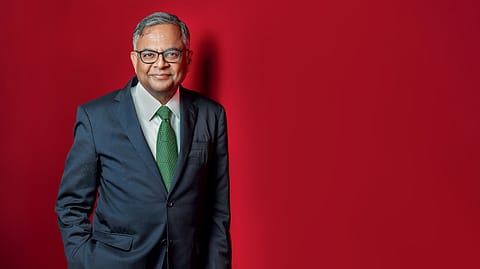Tata Sons' capital largely for new businesses: N Chandrasekaran
Tata Group plans to invest $90 billion by 2027, mostly in India.

Tata Sons' capital will largely go towards new businesses, because every traditional business can fund its growth, says N Chandrasekaran, chairman, Tata Sons. "We will step in if they (traditional business) face any capital shortage," he tells Fortune India in an interview.
"Tata Steel is financially independent. Tata Motors and its subsidiary businesses, including electric vehicles, commercial vehicles and Jaguar Land Rover, are producing strong operating cash. Tata Power is producing enough EBITDA to be able to fund its growth. This is the case with most companies," the chairman details.
In order to build future businesses with strong balance sheets, Tata Group plans to invest $90 billion by 2027. Chandrasekaran, who will be completing six years at the helm of the salt-to-software conglomerate on February 20, said that the group has a huge commitment to capital in India.
"We want to be future-ready and create future businesses with strong balance sheets in the next five years. We want to see what impact we can make on society. A lot of things we can do in scale," he says.
The group will invest $18 billion a year. The capital investments in new high-tech businesses could rise from a quarter to half of the overall investment by 2027, say company officials.
Tata Power had earmarked ₹75,000 crore for green energy in the next five years. Tata and Airbus will be investing ₹20,000 crore in the defence aircraft manufacturing plant. Air India could see over $20 billion investment in acquisition of new aircraft. Tata Electronics with its semiconductor and precision components may witness over $10 billion investment. Tata Digital, which owns the SuperApp Tata Neu, will continue to see investments from Tata Sons as it grows the e-commerce business, according to the group investment plan.
In the last five years until FY22, the holding company Tata Sons has invested ₹110,000 crore in group companies.
Recommended Stories
Chandrasekaran believes the Indian economy is poised for robust growth. "The growth is going to be good if we ensure we don't make mistakes. We need to continue making the right policies. We should not have blocks on the way," says Chandrasekaran.